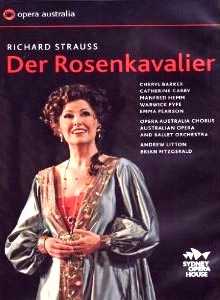For all its rich evocations of 18th century Vienna and skillful balancing of slapstick and the sublime, Der Rosenkavalier’s popularity has always been rooted in its vivid principal characters. Richard Strauss was quite explicit about how the Marschallin, Octavian and Ochs should be portrayed, and the success of a performance often hinges on tapping endearing self-indulgent qualities in each that collectively suggest an extravagant period that’s nearing an end.
Opera Australia’s revival of a 1990 production, now available on a single DVD, hits the mark in spots with some finely etched characterizations and vocally secure performances by three of the continent’s leading singers.
The biggest obstacle is the drab, unimaginative staging that skims over the work’s dilemmas and subtleties and falls short of capturing librettist Hugo von Hoffmannsthal’s “half the time happy, half the time sad” ideal. In places, it’s about as compelling as performing the opera in concert.
Cheryl Barker, who’s won acclaim for her Puccini and Janacek, is an elegant Marschallin whose robust soprano has the requisite depth to convey the character’s introspection and fear of passing time. True to Strauss’ wishes, she doesn’t play her woebegone musings on waning youth in Act 1 as some overwrought farewell to life. But there’s a certain measured quality to her stage manner that doesn’t convey enough of the princess’ vulnerability or mercurial temperament. It’s possible that a stronger directorial hand could have produced a more psychologically complete portrait.
Catherine Carby is an energetic Octavian whose gleaming mezzo can turn a bit strident in the high-lying part but who possesses the clarity and musical values needed for important moments such as Act 2’s “Ich kenn’ ihn schon recht wohl.” She makes a believable teenage boy impersonating a girl in the Mariandl scenes, mugging in a slightly overcaffeinated fashion without sacrificing the character’s credibility.
The most fully rounded portrayal, though, comes from soprano Emma Pearson, whose Sophie is more mature and self-assured than one typically encounters. Her soft, floated high notes and focused tone nicely capture the ingenue’s ecstasies and disappointments, and her acting seems to draw castmates into the most natural exchanges of the evening.
As Ochs, Manfred Hemm is a bit lightweight side both vocally and dramatically, though his native accent gives the proceedings added authenticity. One wishes he’d show something more than mere annoyance when weird apparitions pop up to hector him in the Act 3 inn scene. When he is engaged, Hemm comes off as a one-dimensional, too boorish to make anyone come around to his point of view.
httpv://www.youtube.com/watch?v=g9cuAYh9G7A
In the lesser roles, Warwick Fyfe distinguishes himself as a blustery, upwardly striving Faninal while Andrew Brunsdon and Jacqueline Dark carry on amusingly as the scheming Valzacchi and Anina. Henry Choo is an overwrought Italian Singer.
Though the production shows off some of Australia’s stronger vocal assets, it also exposes the deficiencies of the Sydney Opera House, an architectural gem with an acoustically suspect auditorium and a lamentably small orchestra pit.
Andrew Litton does his best with the reduced instrumental forces, staying attentive to tempi and balances without quite tapping all of the score’s nuance or sardonic humor. His take on the ethereal Act 3 finale came off as a tad slow and slack, failing to match the radiant vocals on stage with a wash of sound.
Brian FitzGerald’s traditional production, rehearsed by Roger Press, seems to treat the story like a fairy tale, with the set breaking apart during the final scene to leave the three female leads alone on a nearly bare stage before Octavian and Sophie are whisked away in a carriage. In other places, the blocking is perfunctory; the Act 2 presentation of the rose has Octavian striding in purposefully from the wings, as if he’s about to give Sophie an amazing deal on a used car.
All this, for better or worse, puts the onus on the leads to carry the story. Thankfully, Barker, Carby and Pearson are up to the task, feeding off each other’s energy and providing beguiling vocal contrasts in the duets and the final trio. Though this may not be the most provocative or echt Rosenkavalier on video, the final scene, rendered in its earnest and tasteful way, could make it a suitable backup choice for the library.



